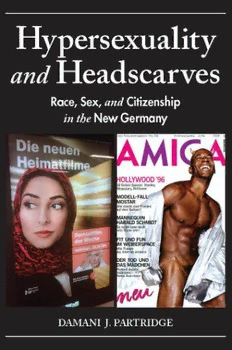
Hypersexuality and Headscarves: Race, Sex, and Citizenship in the New Germany PDF
Preview Hypersexuality and Headscarves: Race, Sex, and Citizenship in the New Germany
i Hypersexuality and Headscarves ii New Anthropologies of Europe Matti Bunzl and Michael Herzfeld, editors Founding Editors Daphne Berdahl Matti Bunzl Michael Herzfeld iii Hypersexuality and Headscarves Race, Sex, and Citizenship in the New Germany DAMANI J. PARTRIDGE Indiana University Press Bloomington and Indianapolis iv This book is a publication of Indiana University Press 601 North Morton Street Bloomington, Indiana 47404-3797 USA iupress.indiana.edu Telephone orders 800-842-6796 Fax orders 812-855-7931 © 2012 by Damani J. Partridge All rights reserved No part of this book may be reproduced or utilized in any form or by any means, electronic or mechanical, including photocopying and recording, or by any information storage and retrieval system, without permission in writing from the publisher. The Association of American University Presses’ Resolution on Permissions constitutes the only exception to this prohibition. o∞ The paper used in this publication meets the minimum requirements of the American National Standard for Information Sciences—Permanence of Paper for Printed Library Materials, ANSI Z39.48-1992. Manufactured in the United States of America Library of Congress Cataloging-in-Publication Data Partridge, Damani J., [date] Hypersexuality and headscarves : race, sex, and citizenship in the new Germany / Damani J. Partridge. p. cm. — (New anthropologies of Europe) Includes bibliographical references and index. ISBN 978-0-253-35708-3 (cloth : alk. paper) — ISBN 978-0-253-22369-2 (pbk. : alk. paper) — ISBN 978-0-253-00531-1 (electronic book) 1. Political anthropology—Germany. 2. Race discrimination—Germany. 3. Sex discrimination—Germany. 4. Citizenship— Germany. 5. Minorities—Germany. 6. Foreign workers—Germany. 7. Post-communism— Germany. 8. Germany—History—Unification, 1990. 9. Germany—Politics and government —1990– 10. Germany—Race relations. I. Title. GN585.G4P28 2012 305.800943—dc23 2011032354 1 2 3 4 5 17 16 15 14 13 12 v This book is dedicated to the four generations of women who have sustained and supported me: Jasmine Josephine Bose Partridge, Sunita Bose Partridge, Dr. Josephine Aona Valiera Allen, Carrie Gwendella Allen, and Dr. Deborah Partridge Cannon Wolfe. This page intentionally left blank vii Contents Acknowledgments ix Prologue 1 Introduction: Becoming Noncitizens 17 1. Ethno-patriarchal Returns: The Fall of the Wall, Closed Factories, and Leftover Bodies 29 2. Travel as an Analytic of Exclusion: The Politics of Mobility after the Wall 50 3. We Were Dancing in the Club, Not on the Berlin Wall: Black Bodies, Street Bureaucrats, and Hypersexual Returns 72 4. The Progeny of Guest Workers as Leftover Bodies: Post-Wall West German Schools and the Administration of Failure 95 5. Why Can’t You Just Remove Your Headscarf So We Can See You? Reappropriating “Foreign” Bodies in the New Germany 108 Conclusion: Intervening at the Sites of Exclusionary Production 133 Epilogue: Triangulated (Non)Citizenship: Memories and Futures of Racialized Production 142 Notes 155 References 167 Index 181 This page intentionally left blank ix Acknowledgments Writing this book has taken much longer and has been much more arduous than I expected. I would like to begin and end by thanking my daughter, my partner, my mother, my grandmothers, my father, my siblings, my nieces, my aunt, my uncle, my cousins, and my friends for creating an environment that helped me to know that writing this book wasn’t the only story. I would like to also thank all of those who participated in the research that led to this book. While some of the people overlap, I owe its completion to both of these groups. Specifically, I thank Eka Neumann, without whom this book would not have been possible. She introduced me to many of my major contacts and dis- cussed my ideas with me in detail from the perspective of an activist and an intellectual. I also thank Anthony Kwame Kongolo, who was an engineering student and student advisor at the Technical University in Berlin at the time; he introduced me not only to Eka, but also to a side of Berlin life that has become central to my understanding of citizenship and processes of exclusionary incor- poration in Berlin and post-unification Germany. I thank Barbara and Erhard Friedemann and their children, my host family in East Berlin with whom I lived for several months when I arrived in 1995, for taking me in as a “for- eign” son and introducing me to a critical history of the German Democratic Republic and German “re”unification as they lived it and reflected on it. I also thank my first host families, the Moritzes (including Andreas Wünderlich), the Tamgüneys, and the Beckhusens in Brake and Frieschenmoor, who cared for me and made me feel at home when I arrived in West Germany as a sixteen- year-old Rotary Youth Exchange student in 1989. Thank you to the members of the Initiative of Black Germans (now known as the Initiative for Blacks in Germany) for granting interviews and allowing me to participate in some of ix
